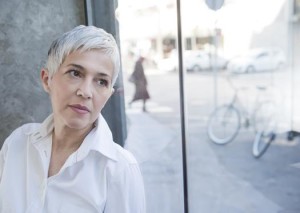 A 16-year-old high school student (we’ll call her Anne) recently stood in front of a packed ballroom to speak at an Alzheimer’s fundraiser. She was there to talk about the effect Alzheimer’s had had on her life. When she was just 12 years old, her 45-year-old father was diagnosed with the disease. He died four years later. She talked about how her tall, handsome father was completely debilitated by the disease, to the point where he was literally afraid of his own reflection. When he saw himself in the mirror, he couldn’t understand why there was a strange man in his home. Anne shared that she lost much of her childhood taking care of her father.
A 16-year-old high school student (we’ll call her Anne) recently stood in front of a packed ballroom to speak at an Alzheimer’s fundraiser. She was there to talk about the effect Alzheimer’s had had on her life. When she was just 12 years old, her 45-year-old father was diagnosed with the disease. He died four years later. She talked about how her tall, handsome father was completely debilitated by the disease, to the point where he was literally afraid of his own reflection. When he saw himself in the mirror, he couldn’t understand why there was a strange man in his home. Anne shared that she lost much of her childhood taking care of her father.
Many people have been unaware of the fact that Alzheimer’s is not just a disease of the elderly. The Alzheimer’s Association estimates that as many as 200,000 Americans have early-onset Alzheimer’s, most of them in their 40s and 50s. Recently, more attention has been paid to this form of the disease.
Early-onset Alzheimer’s has been described as particularly cruel, as it strikes at a time when patients are often beginning to reap the rewards of working hard and raising a family.
This can be particularly hard on caregivers. Early-onset Alzheimer’s often creates even greater burdens for families than the more common late-onset form of the disease. Trying to care for a spouse with the disease – who most likely can no longer work – while raising a family brings a whole new set of challenges to caregiving. That’s why, often, caregiving duties also fall on the children of these families, as demonstrated by Anne in the story above.
Individuals with early-onset Alzheimer’s and their caregivers face a unique set of challenges. Because no one expects a younger person to have the disease, it may be misdiagnosed, and people may not understand or have sympathy for someone living with it. Employers may think someone is simply “losing it” or a spouse may become irritated that their partner in life seems to be letting important tasks go undone.
One of the first things caregivers may face is the question from people who say “S/he’s too young to have Alzheimer’s.” That’s why it’s important for caregivers to become educated. Families should also know that early-onset Alzheimer’s has a genetic component to it, which means that it runs in families. The genetic connection is much stronger in early-onset Alzheimer’s, meaning that if a person’s parent or grandparent is diagnosed with the disease, the person’s chances of developing the condition are much higher compared to those who have a parent or other relative with later-onset Alzheimer’s.
There is a genetic test that can tell if a person has an increased chance of getting the disease. Getting tested is a very personal decision. Before deciding on whether or not to get the test, it’s important to speak with a healthcare professional about the options. For instance, a positive result could affect a person’s ability to obtain life or disability insurance. On the other hand, getting tested could lead to an accurate diagnosis, allowing patient and family to plan ahead, ensure the family will be taken care of, and get treatment. Although there is no cure for Alzheimer’s, there are some treatment options available that may help ease its symptoms.
Washington University in St. Louis is currently conducting clinical trials for people with Autosomal Dominant Alzheimer’s Disease (ADAD), the scientific name given to familial or early-onset Alzheimer’s. The Dominantly Inherited Alzheimer Network Trails Unit (DAIN-TU) is testing drugs to see if there is any way to prevent, delay, or possibly even reverse the effects of the disease in the brain. Study subjects are people at risk for the disease (defined by someone who has either a parent or a sibling with ADAD). For more information, visit http://dian-tu.org.
Learn More
The National Institute on Aging’s Alzheimer’s Disease Education and Referral Center website contains consumer resources about early-onset Alzheimer’s disease.
The Alzheimer’s Association offers information and support for people affected by younger/early onset Alzheimer’s.
Source: Source: Regency Memory Club in association with IlluminAge. Copyright 2015 IlluminAge
